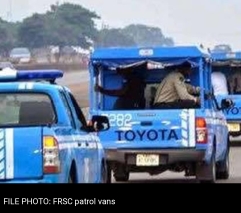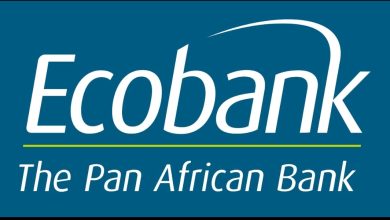
New FRSC Zonal Commander rolls out plans for Lagos-Ogun road safety
CITIZENS COMPASS– In order to further strengthen road safety and traffic conditions in two of Nigeria’s busiest states, Lagos and Ogun States, the Federal Road Safety Corps (FRSC) has deployed the first ever Female Zonal Commander and newly promoted Assistant Corps Marshal, ACM Ann O. Oladayo to the FRSC RS 2 Lagos (covering Lagos and Ogun states).
The deployment is coming on the heels of the impressive record of service within the first year of the Corps no. 1 officer, Corp Marshal Shehu Mohammed, National Association of Online Security News Publishers (NAOSNP) can report.
In One (1) year of Corp Marshal Shehu Mohammed, FRSC has been reinvigorated with outstanding innovations and ideas which he has brought to bear on the processes and operations of the federal government’s traffic agency. As Nigeria continues to increase her population of smartphone users, it is now possible for motorists to get their driver’s license, check their number plates, and obtain safety alerts on the game-changing mobile app developed by the FRSC. The app known as the FRSC app is a one-stop shop for easy business and comfort for Nigerians from any part of the world.
Further, under the watch of the administration of Shehu Mohammed, the FRSC commenced a wonderful idea known as ‘Operation Speed Calming’ which is an avenue to calm the nerves of motorists while on Nigerian roads. Thus, on major roads and highways across Nigeria, such as Third Mainland Bridge, Lagos-Ibadan expressway, and so on, FRSC officers are stationed strategically to demonstrate advocacy and awareness signs which quickly brings to the mind of drivers that they should not stray away in their thoughts and get back in check to ensure their safety. This development has had a remarkable note on conformity with speed regulation and reduction in road crashes.
She expressed excitement in an exclusive interview with the National Association of Online Security News Publishers, NAOSNP about the 1-year in office of her leader, Corp Marshal Shehu Mohammed. ‘When you have your boss, a leader, that is very hardworking, determined, showcasing a lot of Innovative things, projecting FRSC to the world, putting FRSC in the limelight, trying to bring in technological idea into road safety, you know, carry out a lot of things that would put FRSC more on that pedestal that we have been increasing the popularity of FRSC and good successes that has to do with traffic on the highways. Such a person needs to be eulogized. He’s a leader that has done a lot within the short time in FRSC. We are working towards making all efforts to reduce traffic crashes on our highways, fatality rates reduction by 10%, and we’re having a lot of stakeholders’ engagement. We’re having a lot of technological innovations in FRSC. So when you think of such a leader, you have nothing else to say than, this is somebody that should be given a thumbs up, this one is ready to really work, and he’s been doing just that.’
‘There are a lot of policies that he has put in place transforming FRSC and he’s a welfarist. He’s so concerned and very particular about his staff. His policies are in alignment with President Tinubu’s renewed hope agenda. That’s why I eulogize him, that is why he’s somebody that I admired. Because the moment he stepped in and he put his feet on the ground, he started moving. And he has not stopped.’
Sustaining these gains requires a strategic officer and excellent service-oriented leader, hence, the first ever female Zonal Commander for RS 2 Lagos (comprising Lagos and Ogun States), ACM Ann O. Oladayo is the best fit. She was recently promoted as Assistant Corps Marshal (ACM) of the FRSC and posted immediately to RS 2 Lagos (covering Lagos and Ogun states). Her previous role was as Corps Commander in charge of the National Drivers License at the FRSC Headquarters Abuja.
The fellow of security institute, ACM Ann O. Oladayo who resumed her new role about early May 2025 affirmed that the visibility of the FRSC officers on the highway is very important. This is ‘so as to attend to traffic issues when they come up. Aside from that, we do traffic- calming. And more so now we are moving towards the period of festivals. The Ileya festival is approaching. We will see more of our men on the road. We make a lot of deployments during this time, seasonal periods.’
‘Our normal day-to-day activities that we do, we see our men to make sure that the traffic flow is eased. We move traffic on the highway, respond swiftly to crashes on the highway as the case may be. Our presence is very visible. So, it’s in a way trying to make sure that once you see us on the road, it sends a lot of messages to the motoring public that FRSC is on the road. And what we know best to do is to make sure that we reduce traffic crashes. When they see us on the road, they reduce their speed and this makes traffic crashes reduced to the barest minimum.’
‘We also have our ambulance bus stationed in strategic places on the highway, Incase of any traffic crash, we respond quickly. Our response time has really improved. So that we don’t have to have a lot of fatalities on our highway. So, that is part of what we are going to be doing.’
On her vision and plans on this new role in Lagos and Ogun States, she said: ‘Mine is not totally different from what has been in existence, just to improve on it. We have our strategy goals for this year. The first one talks about reducing fatality by 10%. So, we intend to do that all the way. Like I told you, our presence on the highway, response time to crashes, reducing traffic fatality on the highway. These are some of the things that we have put in place to do.’
‘The second one on the strategy goal 2025 talks about stakeholders involvement, engagement, and then funding our programs by 30%. These are some of the things that we have put in place for this year’s strategy goal 2025. So, going forward, our partners, our stakeholders have been forthcoming, assisting us to do some of these programs, thereby stemming that tide and reducing traffic crashes on our highways.’
‘The third one talks about technology. Innovations, we deploy technological advancement like body cameras that our personnel use. When you use a body camera, if any traffic offender sees that they are being captured in real time, it tends to make you behave well on the road. Even if you want to misbehave, when you see that, you will calm down. So, we have that, and we are still trying to deploy more of that. We can use drones, in advanced countries it is being done, and we know Nigeria is well up to that standard by now, we can start using drones. These are some of the things we are looking to improve on.’
‘Our toll-free line is also there. Call 1-2-2 line in case there is any problem. Call quickly. We have a dashboard that shows real time what is happening on our highway. These are some of the technologies that we have improved upon to enhance our workability, and then to enhance our performance on the highway, to make sure that we don’t carry dead bodies on our highways. It pains us when we see people dying on the road. So, that is why we have come.’
‘Lagos is known as the commercial hub of Nigeria. Ogun State and Lagos State have a lot of traffic flowing into Lagos, passing through these corridors. We have no choice other than to step up our game, to make sure that we improve on what we have on the ground before. That is what I and my management team have decided to do. Putting all the best and going all out to make sure that our men are visible on the highways, responding quickly to any occurrence on the highway. That’s what we intend to do in Lagos and Ogun States.’
For truck drivers and other stakeholders, the new ACM in Lagos and Ogun States addressed: ‘We are working on a driving school standardization program. We are having that program ongoing now in which the regulators and the proprietors of driving schools are currently having a two day seminar. It’s a yearly event in which we sensitize driving school proprietors and the instructors to tell them, before you can give somebody a license, they must properly go through that process of training. We are doing new training and refresher courses for them to also know because you cannot give what you don’t have. They are currently undergoing that two-day program cut across the country, the six geopolitical zones. Lagos is hosting its own, started yesterday. The essence is to make sure that these driving school owners also understand the need for them to properly train somebody before they can start driving.’
‘And we spoke extensively about truck drivers yesterday in the program we had at the opening ceremony, some of the lectures we had yesterday. We engaged them, the driving school proprietors and the regulators. That there is a need for them to train their drivers, because some of them are not even looking at the tanker drivers. They are only focusing on maybe the commercial drivers and private car owners. But these tanker drivers, they also need to go through this training. And as such, when you train them, their mentality is changed. We’ll finish with that so they would go all out to train these truck drivers before they mount the wheels they will understand. Many of them might not have gone through the rudiments of this driving training, they just go on the road and start driving. So we want them to be properly trained.’
‘Also they have a tank farm. Before they are loaded at the tank farm, our personnel stationed there, regulate them. We check them before going out. We have a checklist and they must go through this checklist. They must pass before they are allowed. The safety precautions, they must be able to pass before they load and take off and be on the road.’
‘But we also have the problem of over-age tankers. Most of the tankers that carry fuel are overage, many of them have even outlived their usefulness. Because of the situation, many are not able to afford new ones but we still check. We make sure we check but if anybody bypasses FRSC, that is to their own detriment. That’s why sometimes we have some of these crashes on the highway. But we are there to checkmate them. Our men are there 24-7 to make sure that these vehicles, these tanker drivers are checked. So we are doing a lot in terms of that. And we are hoping that the populace, the motoring public, will also appreciate what FRSC is doing in that regard.’
‘So we checked them through driving school. Because that’s the first stage. Before you can go on the road and start driving, you must go through that. You must know how to drive or how to ride. Even as a case for Okada Riders, for these riders because they also have their driver’s license, there’s a rider’s license for people riding in Okada. There is a driver’s license for different categories of vehicles.’
‘There are two major schemes that have to do with interfacing with drivers. We have a Road Traffic Safety Standardization Scheme. We call it RTSSS. Then we also have the Driving School Standardization Program, DSSP. The DSSP brings about the driving schools, regulators, operators of driving schools, all get towards making sure that an average Nigerian that wants to drive on the road is properly licensed after going through the driving school, the training. The RTSSS, Road Traffic Safety Standardization Scheme talks about having fleet operators bringing in their fleets for them to be properly checked and their drivers properly trained. That scheme has been going on since 2007. Once you have two, three, five vehicles in your fleet, you come under us into this scheme. And it is from that scheme we start teaching them. They have their managers, they have their operators, they have different levels of lectures and training that we give them from FRSC. So we nip it in the bud from that.’
‘We also do a lot of enlightenment. Go to schools, go to the car parks, go to mosques, go to churches. We go everywhere to make sure that these people are well enlightened. Garages, NURTW, our partner, we go there, we lecture them. We also have a way of detecting drivers that are drunk. We have breathalyzers, we have alkalizers that we do. We have breather guns, even to measure skis. These are some of the things that we have. We have a lot in FRSC. We do a lot of prevention. We carry out a lot of preventive measures to make sure that these things don’t happen. But we have these recalcitrant drivers there that will still do what they like. So we continue to put in our best. We continue to do what we can do to make sure that these traffic crashes are reduced to the barest minimum on our roads. And these erring drivers are broke to boot. The moment we issue even 50,000 Naira as fines for dangerous driving, for people that drink and drive under the influence of alcohol. We give them tickets, we book them. We correct them. We don’t allow them to continue on that journey until these things ease out from their body. Honestly speaking, we are doing a lot. We just pray for the cooperation of the companies, for the motoring public especially, so that we don’t have these crashes on our highways.’
‘We’ll keep forging ahead to make sure that there is sanity in RS2. That is Zone 2, comprising Lagos and Ogun states. From our highways down to the interiors, because if an accident happens in the corridor or within the town, we will still go there. They will call us, even though we are restricted to the highways. But if it happens within the town, it doesn’t mean we cannot go there and rescue. We are talking about human lives. So we will try and do our best.’
‘With the cooperation of our stakeholders, with the state government, the two respective state governments, we have been working together hand in hand.’
Ann O. Oladayo spoke on the printing of driver’s licenses in Lagos to enhance ease for motorists. ‘There is a lot going on in the driver’s licensing section. And there is a lot of improvement in driver’s licensing in Nigeria. Very soon we will start seeing some deployments which I don’t want to divulge now. But I am telling you with all sincerity that there is a lot going on there. In Lagos, for instance, we have a print farm that is servicing the whole of Lagos and environment so we don’t have to start sending those licenses from Abuja to Lagos. The licenses are printed here at the Lagos zone, and they are dispatched from there. But we are having a lot of licenses that are not been collected at the driver’s license section in Lagos. They should go there and collect it. That’s the area of my own coverage. We are really improving and deploying some new technologies in the driver’s license section. I want to plead that Nigerians should be calm and be patient with us. They will still see many good things happening in the driver’s license section.’
On what to expect during her tenure, Ann O. Oladayo stated: ‘My mantra, I’m following my boss.
My Corps Marshal is a visionary leader. He’s a man that goes for what he wants to do. I am following suit and I would like to say that as the first female Zonal Commander in RS 2 Lagos here, my word to the RS2 comprising Lagos and Ogun is to stay safe and stay alert. Because “an average driver on the road is assumed to be a mad person. So don’t be a mad person”. You must stay safe. Maintain your lane. Drive well. If your vehicle is not good, it doesn’t have any business going on the road. Do a thorough check before you go out every day with your vehicle.’
‘Stay alert, stay focused, and then stay safe on the road and be law-abiding, if you see any traffic person trying to beckon you to stop, please stop. Make sure that you follow the rules and regulations guiding the use of the road. That’s the word I have for Lagosians. Lagos is a place of excellence. We expect nothing short of excellence and as FRSC, Excellence is our watchword. Excellence in everything that we do. On the road, excellence. Everywhere, excellence.’







